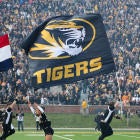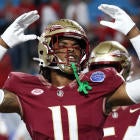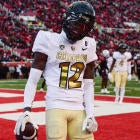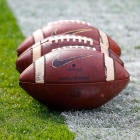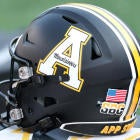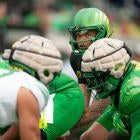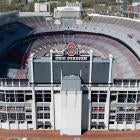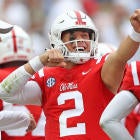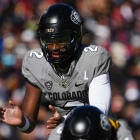College football is celebrating its 150th birthday in 2019, and it's time celebrate as the season draws near. Legendary plays, dramatic games and superstars of the sport have littered the college football landscape during its existence. To help remember the past, the CBS Sports college football crew got together to determine the 25 most iconic moments in college football history.
Obviously, the first football game between Princeton and Rutgers in 1869 gets the whole thing started. There would be no college football without it. But we're looking at everything since then: jaw-dropping on-field moments, key hirings (or firings), advancements in the game that make it what it is today and everything in between.
Let's take a look at 25 of our favorite moments over the 150 years of college football.

Vince Young's go-ahead touchdown vs. USC
The greatest play in the greatest national championship game of all time. The 2006 Rose Bowl between No. 1 USC and No. 2 Texas also has a claim as the greatest game ever, given the programs involved, the number of future NFL players on both sides and the overall stakes. Wrapping it all up in college football's most outstanding stadium didn't hurt, either. There may have been 19 seconds left when Young entered pay dirt for the go-ahead score, but that game was over the moment Young took off on fourth-and-5 from the 9-yard line. It gave Texas its fourth claimed national title and ended USC's 34-game winning streak.
Boise State's trick plays vs. Oklahoma in the Fiesta Bowl
Boise State didn't just need to reach into its bag of trick plays to beat mighty Oklahoma in the 2007 Fiesta Bowl; it needed to scrape the bottom of it. The hook-and-ladder, halfback pass and Statue of Liberty in succession are perhaps the best three play calls in a major bowl game ever. (Coach Bryan Harsin, then the Broncos' offensive coordinator, breaks down the plays below.) The 43-42 overtime win, culminating in running back Ian Johnson's marriage proposal, put the Broncos on the national map where they remain today, even if less dominant.
Desmond Howard strikes the Heisman pose
Former Michigan wideout and current ESPN "College GameDay" analyst Desmond Howard obviously didn't invent the Heisman Trophy pose, but he sure as heck made it more iconic. (Three years ago, we even suggested he could be college football's logo because of it.) Howard's 93-yard punt return for a touchdown against Ohio State was the crowning moment for his Heisman-winning season.
1982 Cal-Stanford: The Play
Was Dwight Garner's knee down? Was the fifth and final lateral from Mariet Ford to Kevin Moen an illegal forward pass? Maybe. There were many controversies to Cal's 25-20 win over John Elway's Stanford Cardinal in 1982's Big Game. But there's one thing every college football fan can agree on: There may be no more iconic call than play-by-play announcer Joe Starkey yelling "Oh, the band is out on the field!" The Play remains one of college football's wildest, most iconic finishes.
Auburn's Kick Six
Between Boise State's trick plays and Cal-Stanford, wild endings have a niche on this list. But I cannot remember having to snap myself out of a state of shock over a single play like I had to for Auburn's Kick-Six against Alabama in 2013. Chris Davis' end zone to end zone return of the Tide's 57-yard attempt is the most unbelievable play I've watched live (though Michigan's fumbled punt vs. Michigan State in 2015 is up there) and gave No. 4 Auburn the walk-off 34-28 Iron Bowl win over the top-ranked Crimson Tide. The play itself is tattooed into college football's psyche, but the context amplifies it by a thousand. Auburn needed a late touchdown with under a minute to play just to tie the game, and yet, Alabama still had a chance to pull off the victory. The Kick-Six helped send Auburn to the final BCS Championship Game and somehow topped the Immaculate Deflection from just one week prior.
RichRod turns down Alabama, which hires Nick Saban
One of college football's most palpable "what ifs?" Rich Rodriguez was the hot coaching commodity at West Virginia and turning down Alabama in 2006 to stay there (albeit for only one more year) remains mind-boggling. John Tally of AL.com did an excellent post-mortem on the 10-year anniversary of the most meaningful job rejection in the sport's history. Following Rodriguez's rejection, Alabama turned its attention to Saban, then the coach of the Miami Dolphins and ... a West Virginia native. As a side note, this pursuit also gave us the infamous "I'm not going to be the Alabama coach" line from Saban. Anyway, 146 wins and five national titles later, suffice to say Alabama is more than happy with the best coach ever.
Marshall's plane crash / 'We are Marshall'
Most of our iconic moments are positive or thrilling. Not this one. The tragic plane crash of Southern Airways Flight 932 in November 1970, cost the lives of 75 people, including 45 members of the Marshall University football team and coaching staff, along with more than two dozen prominent boosters. The worst air tragedy in sports nearly led to the dissolving of the entire football program, but thanks to the efforts of new coach Jack Lengyel, the Thundering Herd fielded a team in 1971. "We are Marshall" has been the school's chant and was turned into a 2006 film starring Matthew McConaughey.
Tim Tebow: 'The Promise'
Tebow was always a polarizing player during his time at Florida, but give him this: he's always been sincere. Nowhere was that on display more than following Florida's 31-30 loss to Ole Miss in 2008. In his post-game press conference, a furious Tebow made an impassioned promise that no one in the country would play harder than the Gators for the rest of the season. Sure enough, Florida won the rest of its games on its way to a national championship. Already a Heisman Trophy winner in 2007, Tebow cemented his lore amongst college football's greatest players with his passionate speech, which is now immortalized in its full length on a plaque attached to Ben Hill Griffin Stadium.
Miami's pass interference call vs. Ohio State
Did Miami defender Glenn Sharpe get to Ohio State wideout Chris Gamble a hair too early? The merits of the infamous defensive pass interference call in the 2003 Fiesta Bowl are debated to this day. Many believe the overtime call was correct, giving the Buckeyes another shot to score a touchdown, which they did in an eventual 31-24 double-overtime victory in the national championship. Others point to how late the flag was thrown. In any case, it remains one of the most controversial calls in the sport's history given the stakes of the game. And what a game! The Hurricanes were stacked with future NFL players and on a 34-game winning streak. This was also the game in which star running back Willis McGahee suffered a brutal knee injury when he was tackled by Ohio State safety Will Allen.
Hail Flutie
Sure, there have been plenty of successful Hail Marys over the years. But more than 30 years later, Doug Flutie's Miracle in Miami stands the test of time. On his way to winning the Heisman Trophy, Flutie launched the ball 64 yards in the air -- against 30 mph winds -- with no time on the clock for the thrilling 47-45 win by Boston College over the Hurricanes on the day after Thanksgiving.
SMU's death penalty
Holy ponies! Was SMU cheatin' in the late 1970s and 1980s or what?! Still, while SMU was hardly alone in allowing recruits and players to be paid in the form of booster-led slush funds, it was the only program to receive the NCAA's dreaded "death penalty" following a massive scandal uncovered by local Dallas media outlets. Today, it is considered the college athletics equivalent of dropping the atomic bomb. The ramifications included the cancellation of the 1987-88 football seasons and a loss of 55 scholarships over four years. The program had exactly one winning season over the next 20 years.
The Fifth Down Game
There are officiating blunders, and then there's the Fifth Down Game between Colorado and Missouri in 1990. The Big Eight contest was marred by the officiating crew accidentally allowing the Buffaloes an extra down coming out of a timeout on what would be their game-winning drive. Mizzou fans, who rushed the field thinking they had won, will also contend that Buffaloes quarterback Charles Johnson was short on his fifth-down keeper. The end of the game was utter chaos, but after a lengthy deliberation, the score stood and Colorado won 33-31 on its way to an AP national championship. The two sides have since agreed to a 2030 game at Mizzou in celebration (if you will) of the 40-year anniversary of that game.
Woody Hayes punches Charlie Bauman
Coaches have been fired for player mistreatment, but it's not often they are let go for actually punching a player. And yet, the Woody Hayes era at Ohio State will be defined by five national championships, a "10-year war" with Bo Schembechler and Michigan ... and punching Clemson's Charlie Bauman in the 1978 Gator Bowl. Incidentally, it was not the first punch Hayes threw at someone, but it ended up being his last. Hayes was let go from Ohio State immediately following the 17-15 loss to the Tigers.
Teddy Roosevelt basically starts the NCAA
Today, the NCAA takes plenty of flak -- much of it deserved -- for the current state of college athletics and amateurism as a whole. To be sure, there are problems with the current layout regarding a player's ability to be compensated for their work, along with rules that inherently benefit the coaches over the players. However, the NCAA membership would not exist today if it weren't for President Teddy Roosevelt. In 1905, President Roosevelt called a meeting with representatives from Harvard, Yale and Princeton to discuss safety measures for a brutal sport that claimed the lives of 18 people that year alone. Those steps would eventually lead to what we know to be the NCAA today. The safety measures in college football are what they are today because of what Roosevelt started.
Knute Rockne's untimely death
Sadly, Marshall's plane crash is not the only tragedy to make this list. The life of legendary Notre Dame coach Knute Rockne was cut all too short in March 1931 when he was killed in a plane crash ear Bazaar, Kansas, while on his way to Los Angeles. The death was a shock not just to college football but the entire country. President Herbert Hoover called Rockne's death "a national loss." Rockne, enshrined in the College Football Hall of Fame, won 105 games at Notre Dame and three national championships. Among them was the 1924 team made famous for the "Four Horsemen" backfield.
Major adjustments to the game
One thing Rockne gets credit for is the forward pass in football. He didn't invent it, but he definitely popularized it in South Bend, Indiana. While the forward pass had been sporadically used for a number of years before, the first "legal" pass is largely credited with being thrown by St. Louis quarterback Bradbury Robinson in 1906 -- around the time Roosevelt pushed for changes to ensure the safety of the game. More changes throughout history that impacted the game include the rise of the Emory Bellard's wishbone offense in the 1960s and 1970, the spread offense by the likes of RichRod in the late 1990s, early 2000s, and the addition of overtime in 1992. Obviously, this is a catch-all for multiple moments, but it's important to recognize major milestones in the game.
Penn State joins the Big Ten
Conference realignment could probably hold a few spots on this list. Take the summer of 2010, for example, when the Pac-16 nearly came to fruition. Ultimately, though, it didn't. And so in parsing through the realignment madness, one could make the point that Penn State joining the Big Ten in 1990 (playing as a member in 1993) was as important as any move in the more modern era. For one, it was the nail in the coffin between the school and the Big East, which former coach Joe Paterno visualized in the form of an eastern all-sports conference. It also would set the tone for future landscape-altering moves in the ACC, Big Ten and SEC while the Big East, ironically, disbanded in football and became the American Athletic Conference.
The first SEC Championship Game
While Penn State's addition to the Big Ten was a seismic move, the SEC made one of its own by adding Arkansas and South Carolina in 1990 (for the 1992 season). The conference also split into two divisions, and thus, the conference championship game was born. The inaugural game between Alabama and Florida, a 28-21 win for the Tide, was played at Legion Field. Since then, it's moved to Atlanta and is still the biggest conference title spectacle in the sport.
Wide Right I/II
Before #collegekickers was a thing, there was Wide Right I and II -- also known as Florida State-Miami in 1991 and 1992, respectively. The Hurricanes won both games by a combined four points thanks to a pair of -- you guessed it -- missed field goals that sailed right. The games also had heavy national championship implications, too, with Miami playing for titles in each of those seasons. Since then, there have been more wide rights, and even a wide left, but the back-to-back gut punches for Florida State in the early '90s get the nod.
Appalachian State's blocked field goal vs. Michigan
You could honestly have a separate category for the entire 2007 college football season as it was, to this day, the most upside-down three months this sport has ever witnessed. But if we're to boil the madness down to a single moment, App State's blocked field goal to seal its 34-32 win over then No. 5 Michigan in the Big House stands out above the rest. It wasn't the biggest upset of all time -- that would actually be Howard over UNLV in 2017 (if we're going off of point spreads). Besides, App State was in the middle of a three-peat FCS national title run at the time. But! it was arguably the most impactful and dramatic upset the sport has seen. It set into motion the end of the Lloyd Carr era and the most banana-nuts series of upsets across the college football landscape in one season.
Nebraska goes for two (and fails)
If you ask former Nebraska coach/athletic director Tom Osborne about going for two in the 1984 Orange Bowl against Miami, he'll tell you the same thing now as he would have back then: no regrets. His intention, even before kickoff, was to win the game, not tie. Still, the 31-30 loss for Osborne's Cornhuskers remains one their most bitter losses and Osborne wouldn't claim a national title for another 11 years. The game, an all-time classic, also propelled the Hurricanes into their decade-long reign of dominance spanning two coaches: Jimmy Johnson and Dennis Erickson.
Clemson hires Dabo Swinney
Earlier this summer, I asked around coaching circles for a list of names of who could be the next Dabo. I quickly learned that's a hard description to fill. Truth is, coaches like Swinney are rare because the circumstances of his hire and ensuing success are rare. Before he was promoted to interim coach for the fired Tommy Bowden in 2008, Swinney was a position coach known for his recruiting chops. He'd never even been a coordinator. To go from that to a pair of national championships is an unexpected ascension to say the least. Now that Clemson's recruiting is at a top-10/top-5 level, this budding co-dynasty with Alabama has no end in sight.
Army-Navy Game following JFK's assassination
Sometimes, national tragedy and sports intertwine. It happened in 2001 following the Sept. 11 attacks when college football resumed on Sept. 20. It also happened in 1963 when Army and Navy played in the weeks following the assassination of President John F. Kennedy. The two academies nearly canceled the game, originally scheduled for Nov. 30, before first lady Jackie Kennedy convinced them to play on Dec. 7 -- the 22nd anniversary of Pearly Harbor. Navy, led by Heisman winner Roger Staubach, won 21-15.
USC brings the first fully integrated team to Alabama
A key moment in the racial history of college football came on Sept. 12, 1970, when USC brought the first fully integrated football team to play in the state of Alabama. The Trojans beat Bear Bryant's all-white Alabama team 42-21 with all six USC touchdowns coming from black players -- including two from Sam "Bam" Cunningham. The aftermath of this pivotal game resulted in Bryant persuading Alabama to integrate its own football team, hastening the integration of football not just for the Crimson Tide but in the entire deep south.
Notre Dame ends Oklahoma's 47-game winning streak
You want to talk about dynasties? Bud Wilkinson's Sooners were a force in the 1950s, winning 47 straight games (and two national titles) from 1953-57. There are a number of reasons to pick any one of those teams as the best to ever play for the Sooners. That made Notre Dame's 7-0 win over Oklahoma on Nov. 16, 1957, all the more incredible. Plenty of college football dynasties have recorded winning streaks into the 30s, but only two programs ever got into the 40s. With the way scholarship limitations increase talent disbursement, this is likely one college football record that will never be broken at the highest level.
Honorable mention: Texas-Texas A&M post-bonfire game, Nebraska's "flea kicker" vs. Missouri, Byron Leftwich being carried down the field, Michael Vick's "Miracle in Morgantown," the "Bush Push" and dozens more.













